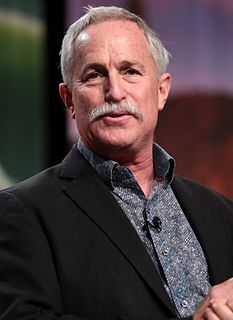A Quote by Rashida Tlaib
We continue to see our elected officials working extra hard to create a 'good climate for business' that leads to disinvestment in public infrastructure and tax incentives to the detriment of cities, while enriching private business and further entrenching poverty. And our cities are told by legislators to use their bootstraps to survive.
Related Quotes
From a business perspective, the question related to cities and sustainability is clear and compelling: can you have a healthy company in an unhealthy city? Arguably, no. Companies need healthy cities to provide reliable infrastructure, an educated and vital workforce, a vibrant economy, and a safe and secure environment to survive and thrive. Business executives have a lot to learn from cities, and a lot to contribute, and this book shows the way, chronicling the successes and the lessons learned about what it takes to make a city healthy, in every sense of the word.
'Cap and trade' generates special interests, lobbyists, and trading schemes, yielding non-productive millionaires, all at public expense. The public is fed up with such business. Tax with 100% dividend, in contrast, would spur our economy, while aiding the disadvantaged, the climate, and our national security.
As a country, Americans have to find a way to keep our cities solvent. If large numbers of cities no longer have the necessary tax base, we have to find federal methods to intervene. If we don't, there's a risk of dozens of cities simply being left to their bankrupt fates - and I can't see how that serves anybody's interests in the long run.
The way our big cities change sucks. The beauty of cities was that they were edgy, sometimes even a little dangerous. Artists, poets, and activists could come and unify and create different kinds of scenes. Not just fashion scenes, scenes that were politically active. Big cities are getting so high-end oriented, business corporate fashion, fashion not in an artistic sense but in a corporate sense. For me that edgy beauty of cities is lost, wherever you go.
By rebuilding transportation so that you're not owning this thing that just sits there all the time, you get to rebuild cities in the process. If we do this right as a country, we have a chance to re-create our cities with the people, rather than cars, at the center. Our cities today have been built for the car. They've been built for car ownership. Imagine walking around in the city where you don't see any parking lots and you don't need that many roads.
Fifty percent of the world's population lives in cities. In a couple of decades, 70 percent of the world's population will be living in cities. Cities are where the problem is. Cities are where the solution is, where creativity exists to address the challenges and where they have most impact. This is why, in 2005, the C40 was founded, an organization of cities that address climate change. It started with 18 cities; now it's 91. Cities simply are the key to saving the planet.
We fight for territory. We see it in our Congress, we see it in our political systems, we see it in our ways of life, how separated we are. When we moved out of the cities and we lost all of the memory that was in cities, and we - one of the highest achievements in our culture is to be able to segregate yourself from everyone else, and the deep thing is the deepest punishment is solitary confinement.

































